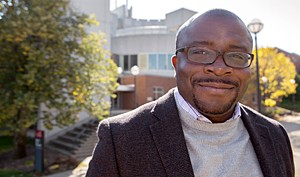
New Research Explores How the Ebola Scare Stigmatized African Immigrants in the United States
The deadly Ebola virus outbreak in West Africa also took its toll socially on one of the fastest growing populations in the United States, African immigrants.
Guy-Lucien Whembolua, a University of Cincinnati assistant professor of Africana studies, leads an analysis of national news coverage of the Ebola scare in a poster presentation on Nov. 2, at the
143rd American Public Health Association (APHA) Annual Meeting and Expo, in Chicago.
The examination reviewed reports in mainstream U.S. media related to African immigrants and the Ebola Virus Disease (EVD). The search turned up 21 news articles that matched the criteria for the study articles focusing on African immigrants in the U.S. and the Ebola virus.
The researchers found that these African immigrants experienced stigma similar to communities stigmatized by the AIDS epidemic in the 80s. There was strong discrimination against homosexual men during the AIDS epidemic and laying blame on that population for the spread of the virus, says Whembolua. Similarly, in the early stages of the Ebola Virus outbreak in West Africa and amid sensationalized reports, we found a fear linked with African immigrants around spreading the disease in the U.S. Some of these populations felt they had to hide their ethnicity in an effort to avoid the stigma.

Image of Guy-Lucien Whembolua, a University of Cincinnati assistant professor of Africana studies
As a result, Whembolua says particularly in New York where theres a high Liberian immigrant population, there was a great deal of shame in being associated with Liberia. Children were teased in high school, or adults were the butt of jokes at work. People from Nigeria also were stigmatized by the Ebola scare, resulting in stress and hardships for these populations, says Whembolua.
The researchers add that understanding this stigma faced by African communities in the U.S. could help improve health promotion programs targeting immigrants. They emphasize that the outbreak highlights a need for research on infectious disease thats relatively unknown in the U.S. and the Western world.
Theres more to the high death rate from the Ebola Virus in West Africa than just the virus itself, says Whembolua. These countries dont have the infrastructures to combat the virus, and most of the populations affected already have low immune systems as the result of living in an impoverished country.
Future UC research involving focus groups with populations stigmatized by the Ebola scare is currently under development in collaboration with Binghamton University.
Other researchers on the project include Donaldson Conserve, a postdoctoral research fellow at University of North Carolina at Chapel Hill; Daudet Ilunga Tshiswaka, a graduate student in the Department of Kinesiology and Community Health, University of Illinois-Champaign; Muswamba Mwamba, a graduate student in the Gillings School of Global Health, University of North Carolina, Chapel Hill; and Michael Gaisie, an undergraduate student in the UC School of Human Services in the College of Education, Criminal Justice, and Human Services.
Whembolua is program chair of the
APHAs Caucus on Refugee and Immigrant Health
and has served in that position since 2014. He is also director of UCs
Africana Health Research Laboratory
in the McMicken College of Arts and Sciences.
The American Public Health Association is the oldest and most diverse organization of public health professionals in the world and is dedicated to improving public health.
UCs Africana Studies Department
in the
McMicken College of Arts and Sciences
is devoted to the academic study of the history, culture, health and politics of African, African-American, Afro-Latin, Afro-Caribbean and Afro-European populations.
Related Stories
UC’s student newspaper names Hajra Munir as new editor-in-chief
May 9, 2025
As a young girl, Hajra Munir, a second-year law and society major, had a passion for writing. “I was always writing,” Munir said. “Whether it was in a journal, writing stories or writing poetry.” But Munir wasn’t sure how she could use her writing skills beyond her love for it, until she watched her brother join the student newspaper at Walnut Hills High School and decided to join him. Since then, journalism has become an integral part of her life. “I started news writing, and I absolutely loved it,” Munir said. “I felt like I could be who I wanted to be, and I felt like this is what I want to do, this is what I love. Journalism has made me such a more confident person, and I wouldn’t be where I am without writing, without starting my love for journalism.” Now, going into her third year at UC, Munir will serve as The News Record’s (TNR) next editor-in-chief for the 2025-2026 school year. TNR is UC’s student run news organization, where students themselves have opportunities to report on an array of topics, from breaking campus news to entertainment and lifestyle.
Modern tech unlocks secrets of ancient art
May 7, 2025
A Classics researcher at the University of Cincinnati is using state-of-the-art technology to learn more about the mass production and placement of votives in ancient Greece.
First Marian Spencer Scholar graduates during UC’s Spring...
May 7, 2025
Katelyn Cotton, a political science major, became the first student in the Marian Spencer Scholarship program, to graduate from the University of Cincinnati during the May 2 Spring Commencement ceremonies.
